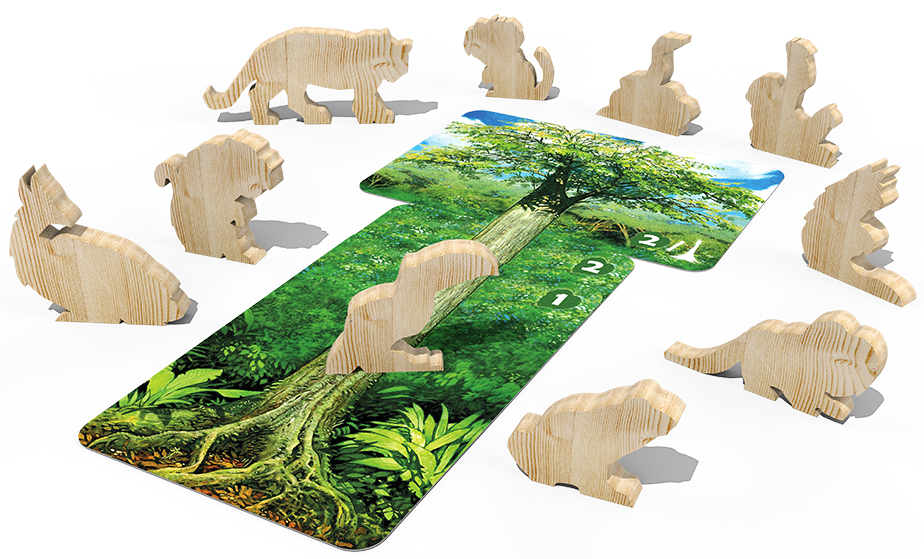Table of Contents
Does this small box card game reach the skies?

Canopy, designed by Tim Eisner and published by Weird City Games is a card drafting and set collection game primarily for two players (with 3-4 player and solo variants included), which plays in about 20-30 minutes, where players compete to build the most diverse rainforest with the goal of ultimately scoring more points than their opponent. However, with more small box card games releasing than ever before, does Canopy stand out from the crowd enough to make it worth your time?
The first thing you will likely notice about Canopy is the stunning visuals. The artwork for the game is provided by the ever-excellent Vincent Dutrait and the game has a great table presence, with vibrant colours catching the eye at every turn. The art for each type of card is also unique and easy to see at a glance, which is important for reading your opponent’s board state from across the table when deciding which cards you should draft or potentially leave for them. The beautiful table presence does come at a cost though, as Canopy takes up a deceptive amount of table space for the components involved, making it less viable for taking out and about than some other games of its ilk.
The game is played over three rounds (seasons), with players alternating between selecting cards from three sets, laid out in the middle of the table. The active player will look at the first pile and decide to either take the card/s presented, or pass to the next pile, adding a new card face down to any they pass. If a player passes all three piles, they take the top card of the deck to add to their forest.
Cards come in six types:
Tree trunks/canopies – These allow you to either add a trunk section to an uncompleted tree to make it taller or add a canopy to the top of a trunk to complete a tree. Points are awarded for tallest trees per season and most completed trees at the end of the game so you have to think strategically. Both trunk and canopy cards have different point values, which can significantly change how much a given tree is worth.
Plants – There are three plant types in the base game which score differently. Bromelia cards are worth seven points if you have two of them, but any more than two and they’re worth minus three! Monstera doesn’t score anything for having fewer than three and then the points value is fixed at eight thereafter. Ferns score progressively more points the more you have, but only if you have an odd number in your forest at the end of the season, if you’re left with an even number they’re worthless.
Animals – Cute cards (with the exception of a couple of creepy crawlies) such as jaguars, poison dart frogs and kinkajous. These come in pairs, one card typically scoring points (extra points if you complete the pair) and the other offering special abilities. A chance to take a peek at the face-down cards or to make your opponent discard one for example.
Threats – Disease cards pose a threat to the wildlife in your rainforest and fire takes aim at your plants, during scoring. Drought and lightning are additional threats with immediate effect and can cause you to lose or gain cards.
Weather – Extra points are available per pair of rain and sun cards collected.
Seeds – These cards allow you to draw bonus cards from a separate seed deck at the end of the season, potentially getting you extra plants, weather cards, tree trunks or canopies.
When the season is over, players score for any completed trees, plants, and weather before resetting for the next season. At the end of the third and final season, wildlife is also scored and the final points are tallied.
One of the biggest strengths of Canopy is how simple and snappy its core loop is, but that it also includes enough mechanical depth that it feels like thoughtful play is rewarded.
For instance, although initially negative on the surface, fire cards can be used to your benefit to help clear your forest of unwanted plant cards before scoring. They also allow you to draw more cards from the seed deck, which is a nice thematic touch, as new growth springs forth from the charred land.
Card Drafting in Canopy
The card drafting also ensures you are constantly keeping an eye on your opponent’s forest, and trying to ensure they don’t receive beneficial cards or leave them with cards that will hinder their progress.
The game plays quickly, and you’ll immediately want to reset for another game. My only real concern is that after a couple of games it begins to feel repetitive as the variety of cards is not huge. That being said, Canopy does include a handful of ‘advanced’ cards that they recommend adding in after a couple of plays. Having used these now, I wouldn’t play without them, they add more variety and unique abilities to the plants, animals and threat cards. There is also a separate module entitled ‘Shifting Seasons’ which adds a different element to each season that players need to consider (similar to the season’s cards in Parks, for instance). Again, once you are comfortable with the base game, I would recommend adding this for all games thereafter.
My only minor criticisms are the point tokens, which are needlessly fiddly, I feel a shared board to track point totals would have been more appropriate. There are also a couple of zero-point canopy cards in the deck. Typically a canopy will score one or two points per tree trunk it sits over, rewarding you for building larger trees. The zero point canopy cards feel deflating as they can make you feel like building a large tree was a waste (even with a bonus available for the tallest tree). Sure, you can always leave these for your opponent, but untopped trees go unscored so it’s risky. Personally, I feel that each canopy card should at least score one point per tree trunk piece underneath it.

Canopy in Summary
All in all, Canopy is a strong recommendation for anyone who likes head to head, two-player card games and it easily stands alongside similar drafting games such as Caper and Tides of Time. It is affordable, easy to teach and looks beautiful on the table. It will definitely be staying in my collection for the foreseeable future and I would love to see an expansion at some point down the road, or maybe a digital implementation.
| Prices delivered by BoardGamePrices | |
|---|---|
 | Canopy £18.48 with shipping, in stock! Buy now See all 24 offers! |

